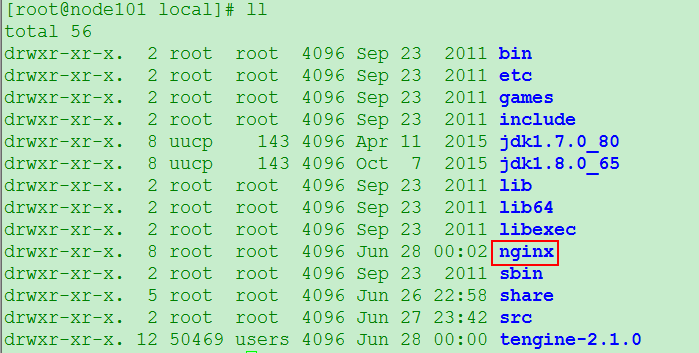环境
tengine-2.1.0
Tengine是由淘宝网发起的Web服务器项目。它在Nginx的基础上,针对大访问量网站的需求,添加了很多高级功能和特性。Tengine的性能和稳定性已经在大型的网站如淘宝网,天猫商城等得到了很好的检验。它的最终目标是打造一个高效、稳定、安全、易用的Web平台。
一、安装tengine
1、nginx依赖 gcc openssl-devel pcre-devel zlib-devel
[root@node101 tengine-2.1.0]# yum install gcc openssl-devel pcre-devel zlib-devel -y
2、安装Nginx
[root@node101 tengine-2.1.0]# ./configure && make && make install
注意:tengine默认安装目录:/usr/local/nginx

3、将Nginx配置为系统服务,以方便管理。
(3.1)在/etc/rc.d/init.d/目录中建立文本文件nginx,在文件中粘贴下面的内容:
#!/bin/sh # # nginx - this script starts and stops the nginx daemon # # chkconfig: - 85 15 # description: Nginx is an HTTP(S) server, HTTP(S) reverse # proxy and IMAP/POP3 proxy server # processname: nginx # config: /etc/nginx/nginx.conf # config: /etc/sysconfig/nginx # pidfile: /var/run/nginx.pid # Source function library. . /etc/rc.d/init.d/functions # Source networking configuration. . /etc/sysconfig/network # Check that networking is up. [ "$NETWORKING" = "no" ] && exit 0 nginx="/usr/local/nginx/sbin/nginx" prog=$(basename $nginx) NGINX_CONF_FILE="/usr/local/nginx/conf/nginx.conf" [ -f /etc/sysconfig/nginx ] && . /etc/sysconfig/nginx lockfile=/var/lock/subsys/nginx make_dirs() { # make required directories user=`nginx -V 2>&1 | grep "configure arguments:" | sed 's/[^*]*--user=([^ ]*).*/1/g' -` options=`$nginx -V 2>&1 | grep 'configure arguments:'` for opt in $options; do if [ `echo $opt | grep '.*-temp-path'` ]; then value=`echo $opt | cut -d "=" -f 2` if [ ! -d "$value" ]; then # echo "creating" $value mkdir -p $value && chown -R $user $value fi fi done } start() { [ -x $nginx ] || exit 5 [ -f $NGINX_CONF_FILE ] || exit 6 make_dirs echo -n $"Starting $prog: " daemon $nginx -c $NGINX_CONF_FILE retval=$? echo [ $retval -eq 0 ] && touch $lockfile return $retval } stop() { echo -n $"Stopping $prog: " killproc $prog -QUIT retval=$? echo [ $retval -eq 0 ] && rm -f $lockfile return $retval } restart() { configtest || return $? stop sleep 1 start } reload() { configtest || return $? echo -n $"Reloading $prog: " killproc $nginx -HUP RETVAL=$? echo } force_reload() { restart } configtest() { $nginx -t -c $NGINX_CONF_FILE } rh_status() { status $prog } rh_status_q() { rh_status >/dev/null 2>&1 } case "$1" in start) rh_status_q && exit 0 $1 ;; stop) rh_status_q || exit 0 $1 ;; restart|configtest) $1 ;; reload) rh_status_q || exit 7 $1 ;; force-reload) force_reload ;; status) rh_status ;; condrestart|try-restart) rh_status_q || exit 0 ;; *) echo $"Usage: $0 {start|stop|status|restart|condrestart|try-restart|reload|force-reload|configtest}" exit 2 esac
(3.2)修改nginx文件的执行权限
[root@node101 init.d]# chmod +x /etc/rc.d/init.d/nginx
(3.3)添加该文件到系统服务中去
[root@node101 init.d]# chkconfig --add /etc/rc.d/init.d/nginx
查看是否添加成功,on和off分别指服务被启动和停止
[root@node101 init.d]# chkconfig --list nginx nginx 0:off 1:off 2:off 3:off 4:off 5:off 6:off
4、通过服务启动,停止,重启nginx
service nginx start|stop|restart
[root@node101 init.d]# service nginx start
Starting nginx: [ OK ]

二、配置Nginx
使用nginx收集请求日志,针对业务设计的请求链接格式来配置nginx日志记录格式,这里我们请求都是以http://wjy.com/log.gif?requestdata,修改配置文件:/usr/local/nginx/conf/nginx.conf
1、设置日志格式:
log_format my_format '$remote_addr^A$msec^A$http_host^A$request_uri';#定义日志格式my_format
解释日志参数:
remote_addr:客户端的IP;
msec:当前的Unix时间戳;
http_host指的就是请求头里的host属性;
request_uri就是完整url中刨去最前面主机剩下的部分:/log.gif?requestdata;
^A是自定义的分隔符
2、URL匹配规则
location = /log.gif { default_type image/gif;#请求内容类型 access_log /opt/data/access.log my_format; #请求日志存放路径以及所使用的日志格式 }
最后配置nginx.conf:
#user nobody; worker_processes 1; #error_log logs/error.log; #error_log logs/error.log notice; #error_log logs/error.log info; #pid logs/nginx.pid; events { worker_connections 1024; } # load modules compiled as Dynamic Shared Object (DSO) # #dso { # load ngx_http_fastcgi_module.so; # load ngx_http_rewrite_module.so; #} http { include mime.types; default_type application/octet-stream; #log_format main '$remote_addr - $remote_user [$time_local] "$request" ' # '$status $body_bytes_sent "$http_referer" ' # '"$http_user_agent" "$http_x_forwarded_for"'; log_format my_format '$remote_addr^A$msec^A$http_host^A$request_uri'; #access_log logs/access.log main; sendfile on; #tcp_nopush on; #keepalive_timeout 0; keepalive_timeout 65; #gzip on; server { listen 80; server_name localhost; #charset koi8-r; #access_log logs/host.access.log main; location / { root html; index index.html index.htm; } location = /log.gif { default_type image/gif; access_log /opt/data/access.log my_format; } #error_page 404 /404.html; # redirect server error pages to the static page /50x.html # error_page 500 502 503 504 /50x.html; location = /50x.html { root html; } # proxy the PHP scripts to Apache listening on 127.0.0.1:80 # #location ~ .php$ { # proxy_pass http://127.0.0.1; #} # pass the PHP scripts to FastCGI server listening on 127.0.0.1:9000 # #location ~ .php$ { # root html; # fastcgi_pass 127.0.0.1:9000; # fastcgi_index index.php; # fastcgi_param SCRIPT_FILENAME /scripts$fastcgi_script_name; # include fastcgi_params; #} # deny access to .htaccess files, if Apache's document root # concurs with nginx's one # #location ~ /.ht { # deny all; #} } # another virtual host using mix of IP-, name-, and port-based configuration # #server { # listen 8000; # listen somename:8080; # server_name somename alias another.alias; # location / { # root html; # index index.html index.htm; # } #} # HTTPS server # #server { # listen 443 ssl; # server_name localhost; # ssl_certificate cert.pem; # ssl_certificate_key cert.key; # ssl_session_cache shared:SSL:1m; # ssl_session_timeout 5m; # ssl_ciphers HIGH:!aNULL:!MD5; # ssl_prefer_server_ciphers on; # location / { # root html; # index index.html index.htm; # } #} }
测试:
本地启动tomcat web应用,访问界面:


在/opt/data/access.log查看日志:
[root@node101 data]# tail -f access.log 192.168.118.1^A1561656575.201^Anode101^A/log.gif?en=e_l&ver=1&pl=website&sdk=js&u_ud=E5631595-EDC2-4B3B-A306-B19576D74DC3&u_sd=C7C0D4E3-7E60-479B-AC1C-2F5305EC20D4&c_time=1561627763553&l=zh-CN&b_iev=Mozilla%2F5.0%20(Windows%20NT%206.1%3B%20Win64%3B%20x64)%20AppleWebKit%2F537.36%20(KHTML%2C%20like%20Gecko)%20Chrome%2F75.0.3770.100%20Safari%2F537.36&b_rst=1920*1080 192.168.118.1^A1561656575.209^Anode101^A/log.gif?en=e_pv&p_url=http%3A%2F%2Flocalhost%3A8080%2FBIG_DATA_LOG2%2Fdemo.jsp&p_ref=http%3A%2F%2Flocalhost%3A8080%2FBIG_DATA_LOG2%2F&tt=%E6%B5%8B%E8%AF%95%E9%A1%B5%E9%9D%A21&ver=1&pl=website&sdk=js&u_ud=E5631595-EDC2-4B3B-A306-B19576D74DC3&u_sd=C7C0D4E3-7E60-479B-AC1C-2F5305EC20D4&c_time=1561627771147&l=zh-CN&b_iev=Mozilla%2F5.0%20(Windows%20NT%206.1%3B%20Win64%3B%20x64)%20AppleWebKit%2F537.36%20(KHTML%2C%20like%20Gecko)%20Chrome%2F75.0.3770.100%20Safari%2F537.36&b_rst=1920*1080 192.168.118.1^A1561656582.756^Anode101^A/log.gif?en=e_pv&p_url=http%3A%2F%2Flocalhost%3A8080%2FBIG_DATA_LOG2%2Fdemo2.jsp&p_ref=http%3A%2F%2Flocalhost%3A8080%2FBIG_DATA_LOG2%2Fdemo.jsp&tt=%E6%B5%8B%E8%AF%95%E9%A1%B5%E9%9D%A22&ver=1&pl=website&sdk=js&u_ud=E5631595-EDC2-4B3B-A306-B19576D74DC3&u_sd=C7C0D4E3-7E60-479B-AC1C-2F5305EC20D4&c_time=1561627781910&l=zh-CN&b_iev=Mozilla%2F5.0%20(Windows%20NT%206.1%3B%20Win64%3B%20x64)%20AppleWebKit%2F537.36%20(KHTML%2C%20like%20Gecko)%20Chrome%2F75.0.3770.100%20Safari%2F537.36&b_rst=1920*1080 192.168.118.1^A1561657012.776^Anode101^A/log.gif?en=e_pv&p_url=http%3A%2F%2Flocalhost%3A8080%2FBIG_DATA_LOG2%2Fdemo.jsp&p_ref=http%3A%2F%2Flocalhost%3A8080%2FBIG_DATA_LOG2%2F&tt=%E6%B5%8B%E8%AF%95%E9%A1%B5%E9%9D%A21&ver=1&pl=website&sdk=js&u_ud=E5631595-EDC2-4B3B-A306-B19576D74DC3&u_sd=2C6CB48F-B1DA-4B50-8489-5DD90BCCA773&c_time=1561628194593&l=zh-CN&b_iev=Mozilla%2F5.0%20(Windows%20NT%206.1%3B%20Win64%3B%20x64)%20AppleWebKit%2F537.36%20(KHTML%2C%20like%20Gecko)%20Chrome%2F75.0.3770.100%20Safari%2F537.36&b_rst=1920*1080
三、flume agent配置
a1.sources = r1 a1.sinks = k1 a1.channels = c1 a1.sources.r1.type = exec a1.sources.r1.command = tail -F /opt/data/access.log a1.sinks.k1.type=hdfs a1.sinks.k1.hdfs.path=hdfs://node101:8020/log/%Y%m%d a1.sinks.k1.hdfs.rollCount=0 a1.sinks.k1.hdfs.rollInterval=0 a1.sinks.k1.hdfs.rollSize=10240 a1.sinks.k1.hdfs.idleTimeout=5 a1.sinks.k1.hdfs.fileType=DataStream a1.sinks.k1.hdfs.useLocalTimeStamp=true a1.sinks.k1.hdfs.callTimeout=40000 a1.channels.c1.type = memory a1.channels.c1.capacity = 1000 a1.channels.c1.transactionCapacity = 100 a1.sources.r1.channels = c1 a1.sinks.k1.channel = c1